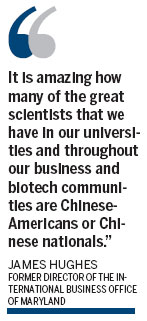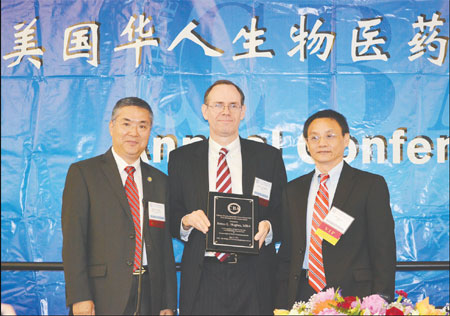US-China bio-pharm group grows with members' success
Updated: 2013-06-20 11:02
By Cai Chunying in Washington (China Daily)
|
||||||||
|
James Hughes (center), vice-president and chief enterprise and economic development officer of the University of Maryland, Baltimore, receives a Brilliant Achievement Award from Richard Zhao (left), president of Chinese Biopharmaceutical Association, and Ping Chen, president-elect of the organization, during its 18th annual conference. Cai Chunying / China Daily |

Eighteen years ago, James Hughes, then director of the international business office of the State of Maryland, was approached by a group of Chinese-American scientists. They asked for his help with the first annual conference of their newly founded organization, the Chinese Biopharmaceutical Association, USA, or CBA.
Hughes lent his support, getting the governor involved, recruiting high-profile speakers, and becoming one of the conference's first sponsors. "Part of what I was doing was working for the state trying to help technology companies and also to expand trade and investment relationships with China," Hughes told China Daily.
Last weekend, the now full-fledged CBA officially thanked Hughes at their 18th annual conference with their Brilliant Achievement Award for his efforts in international cooperation on biopharmaceuticals. Hughes, who now serves as vice-president and chief officer of enterprise and economic development at the University of Maryland, Baltimore, a school that excels in biomedical research, said, "CBA is very helpful in introducing us to people in China."
According to Richard Zhao, president of CBA and director of the Transnational Genomics Laboratory and Molecular Diagnostics Laboratory at the University of Maryland's Medical Center, most of the founding members of CBA were among the first generation of Chinese students who came to the US in pursuit of postgraduate degrees after China opened up to the world in late 1970s.
"Biopharmaceutical science entered its boom era in the 1980s," recalled Dajun Yang, a founding member and former president of CBA, who flew in from China to attend the conference at the University of Maryland. "Many of us participated in the early development of the field in the US and gained substantial knowledge and skills, which we could then use in our own practice and to promote collaborations between the US and China."
When CBA was established in 1995, most of its members were junior scientists at research organizations such as Food Drug Administration and National Institutes of Health; some were still doctoral students. Since then, many of them have become leading scientists in their fields and some have established their own biopharmaceutical companies in both the US and China.
Yang, who built a successful company specializing in the discovery and development of cancer drugs, held professorships at several US universities before being recruited by China's "National 1,000 Plan," which attracts top Chinese scientists overseas to return to China to conduct their research or start companies.
Yang said that more than 20 members of CBA have entered the "National 1,000 Plan."
The CBA has grown along with its members' success. The organization now has more than 700 active members worldwide, including more than 60 institutional members, making it one of the largest and most well-established Chinese-American professional associations in the US.
This year's conference, titled "Global Partnership in Biopharmaceutical and Translational Medicine," attracted more than 600 attendees, including scientist, researchers, entrepreneurs, venture capitalists, and government officials from both the US and China.
Maryland governor Martin O'Malley sent a congratulatory letter to this year's CBA conference, recognizing CBA's "outstanding contribution and commitment" in its ongoing efforts to "connect the biopharmaceutical industries of China and the United States."
CBA helped to organize a good number of business meetings for the governor's China trip in May 2011.
Representatives of economic districts and industrial parks from Beijing, Nanjing, and Sichuan province attended the conference with attractive incentive programs, hoping to entice Chinese-American scientists and US companies to establish start-ups or joint-venture in their areas.
According to Ping Chen, president-elect of CBA, some have shown great interest in Novavax, a leading vaccine company in Rockville, Maryland and would explore collaborative opportunities in developing vaccine that can fight the recent H7N9 bird flu in China.
"It is amazing how many of the great scientists that we have in our universities and throughout our business and biotech communities are Chinese-Americans or Chinese nationals," Hughes said. "What CBA has done is to provide a community for them."
charlenecai@chinadailyusa.com
(China Daily USA 06/20/2013 page2)

 Michelle lays roses at site along Berlin Wall
Michelle lays roses at site along Berlin Wall
 Historic space lecture in Tiangong-1 commences
Historic space lecture in Tiangong-1 commences
 'Sopranos' Star James Gandolfini dead at 51
'Sopranos' Star James Gandolfini dead at 51
 UN: Number of refugees hits 18-year high
UN: Number of refugees hits 18-year high
 Slide: Jet exercises from aircraft carrier
Slide: Jet exercises from aircraft carrier
 Talks establish fishery hotline
Talks establish fishery hotline
 Foreign buyers eye Chinese drones
Foreign buyers eye Chinese drones
 UN chief hails China's peacekeepers
UN chief hails China's peacekeepers
Most Viewed
Editor's Picks

|

|

|

|

|

|
Today's Top News
Shenzhou X astronaut gives lecture today
US told to reassess duties on Chinese paper
Chinese seek greater share of satellite market
Russia rejects Obama's nuke cut proposal
US immigration bill sees Senate breakthrough
Brazilian cities revoke fare hikes
Moody's warns on China's local govt debt
Air quality in major cities drops in May
US Weekly

|

|









